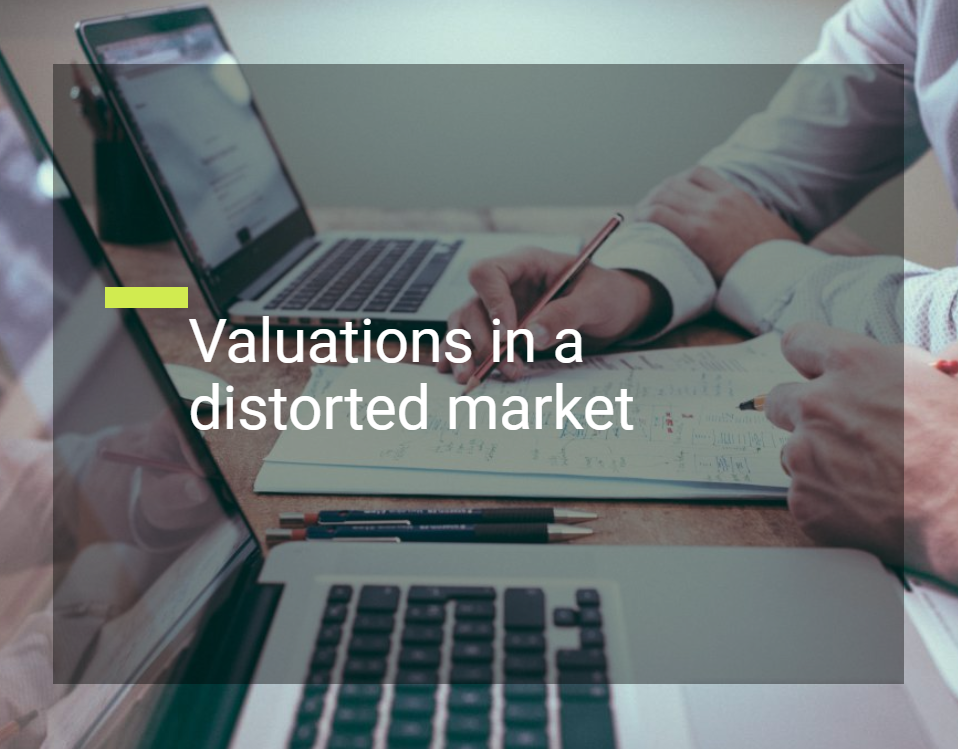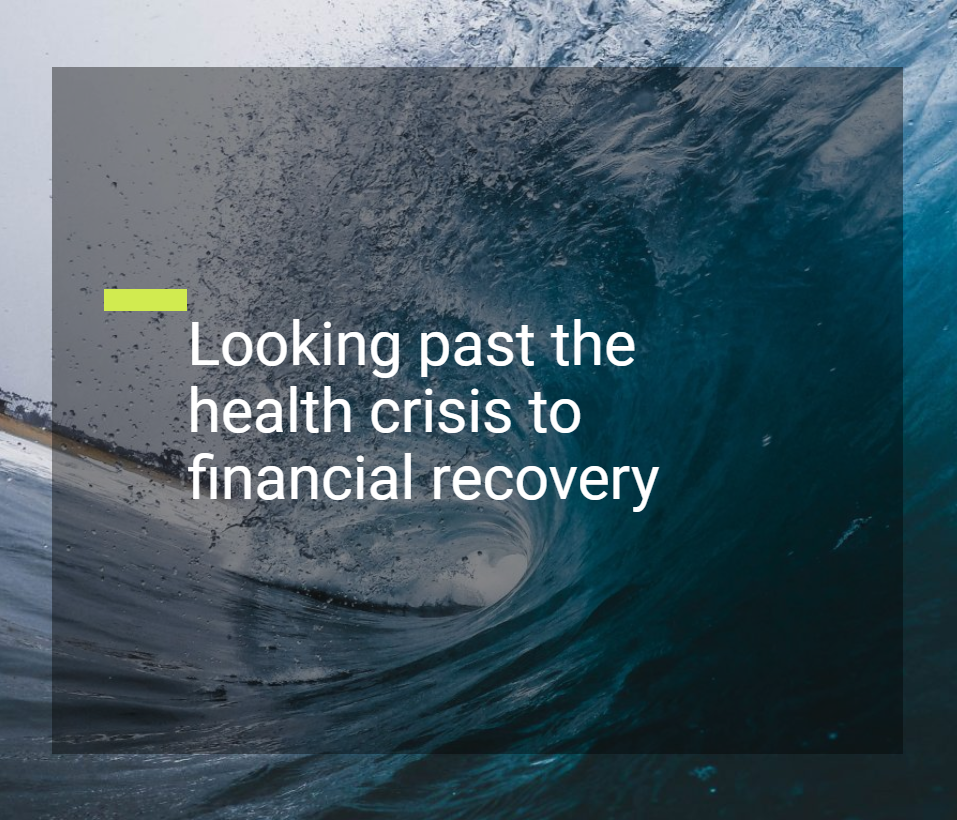Suggested Reading:
Over the last few weeks we have been shining the spotlight on the ‘Seven Cs of Business Recovery’. A framework developed by Neil Hughes, Managing Partner at Baker Tilly in Ireland back in 2010 following Ireland’s financial crash, it is as relevant today as it was ten years ago as businesses worldwide come to terms with the fallout of a pandemic not seen before ...

Baker Tilly Ireland's Neil Hughes looks at why securing the support of your employees is even more crucial in times of crisis. Many owners and managers often see themselves as the most important people in the organisation. However, it is the hard work and support of their employees that is an integral part of helping a business through times of change and disruption...

The steps businesses take now will play a pivotal role in determining how they emerge from the shadow of COVID-19. At front of mind for many businesses will be assessing and applying for available government aid and stimulus packages, with extensive financial packages including the likes of wage subsidies, subsidised or low-interest loans and rent relief on offer around the world...
Tech, travel key to M&A recovery
While the COVID-19 health crisis continues to reset business expectations for 2020, the impact on some sectors has been more positive than others — and that is translating to increased activity in M&A.
Reviewing activity across the Asia Pacific network, Baker Tilly experts say there is increased movement in some sectors and activity commencing earlier than expected as countries exit lockdowns.
But amid the optimism is the threat of future slowdowns if the virus cannot be brought to heel.
Baker Tilly International’s Asia Pacific Director Harsh Maheshwari said there were many questions from clients around M&A opportunities as well as those seeking advice on how to accurately value a company and navigating the challenges of completing cross-border deals.
Companies were already navigating through choppy seas when it came to M&A before the COVID-19 crisis, when the top concerns for dealmakers were the US-China trade wars and Brexit.
“Many were using M&A in response to tariff and trade barriers between the major economic powers, to mitigate the risks from geopolitical uncertainty and nationalism,” he says.
COVID had compounded those issues, he said, but the reigniting of tension between the US and China, and other geopolitical issues, were also creating uncertainty and threatening global trade.
“There’s so much uncertainty in the market right now and investors are looking at us for guidance on what they need to do,” Mr Maheshwari says.
In 2019, there was a slight decline in M&A compared to previous years and while piloting wasn’t easy, a course for doing business could be plotted with careful negotiation and dealmakers had put solid strategies in place.
But the coronavirus crisis was a storm front that grew quickly and struck fiercely, leaving M&A activity exposed to the elements in ways that were almost impossible to prepare for.
“The value of global M&A activity in the first quarter of 2020 fell by 35% as compared to the last quarter of 2019,” he says.

One sector emerging strongly from the coronavirus lockdowns is technology, backed in part by the immediate investment needed in digital infrastructure for companies across industries, as well as the ongoing demand likely to be generated due to changes in the way people live, work and shop.
It’s a sector that is of particular interest to private equity firms sitting on record levels of dry powder, as much as US$1.5 trillion, says Managing Director of Baker Tilly China Huang Wei.
He believes in-demand sectors will include 5G technology, innovation and the implementation of AI as businesses reposition and digital companies grow their market share.
“Now is not a good moment in China and internationally. But we see there is corporate venture capital increase of 20 per cent,” he says.
“What is corporate venture capital? That is represented by corporations like Alibaba, Tencent, Baidu Xiaomi, these kind of high technology companies. They focus on strategic investment in innovation enterprise to build up their ecosystem.”
Mr Wei says as an advisor, he suggests his clients focus on AI, smartphones and similar technologies designed to expedite the engagement with customers or improve efficiency.
“But if we talk about the traditional industry like restaurants or traditional production, we are more careful and cautious in the evaluations,” he says.
“Now in the Chinese market, there is a lot of demand on investment, and you can find a lot of opportunities to invest, but you need to be very careful to make a choice." - Huang Wei
“Now in the Chinese market, there is a lot of demand on investment, and you can find a lot of opportunities to invest, but you need to be very careful to make a choice.”
For India, technology had also proved its worth in recent months, often making the difference as to whether a business could continue trading, and helping separated families stay connected.
Gaurav Drolia, Corporate Advisory Partner with Baker Tilly DHC India, says the world can’t go back to where it was.
“In a country like India, where brick and mortar shops and retailers were spread all across areas, we’ve seen a sudden increase in online shopping and e-commerce businesses have thrived,” he says.
“The Amazons, the Alibabas, the Walmarts and Flipkart in India are doing stupendously well now.
“We’ve experienced this as well, doing webinars and video conferencing with our clients, and using Zoom and Slack for example. These technologies are here to stay.”
Mr Drolia believes technology deals are inevitable because investors and company executives themselves can see the value of digital services and are confident of a strong rebound.
“In the recession after 2008, the tech companies came out stronger given their strong fundamentals and higher cash reserves. We expect something similar in this era as well,” he says.
“In a recent report on the tech industry and the M&A deals, 63% of the experts expected a V-shaped recovery in the tech industry compared to that of 38% for non-technology sectors.
“Some 61% of the executives in the tech sector were expected to actively pursue M&A activity in the next 12 months. This was up from about 40% in October 2018.
“Then 65% of the executives in the tech sector are expected to pursue cross-border technology acquisition. These are big numbers we’re talking about for the tech sector.”
Mr Drolia added that when it came to technology, selling the story and the potential can be more important than a solid financial record. As buyers looked to move on likely targets, getting that story right was more important than ever.
“When you are looking at valuations, it is critical to think about selling a good story that works for investors, and typically, you can’t look at the traditional metrics” – Adrian Cheow
“I remember doing one of the valuations for a South Indian company, which was into deep red for the last five years,” he says.
“An Israeli company bought it out for $25 million. And I thought, wow, we are attributing price to stories now. I think that’s what is in store for the tech sector.”
Singapore — long a hub for technology — has benefited from government incentives for companies to test and roll-out new products by creating sandboxes. It’s helped drive early-stage investment, says Adrian Cheow, Executive Director Deal Advisory at Baker Tilly Singapore.
“When you are looking at valuations, it is critical to think about selling a good story that works for investors, and typically, you can’t look at the traditional metrics,” he says.
“These businesses have limited revenue and probably zero track record in terms of profitability. But their valuation lies in the quality of their story and what an investor thinks they can achieve in the future.
“When you are working in this space, it’s really about the trust that you can build in the company and its management as well as where they operate as a market.”

Australia and New Zealand have been fortunate in avoiding the high death toll and widespread community transmission of COVID-19 seen elsewhere, allowing a faster return to normal – and to dealmaking.
But that process is likely to accelerate once buyers can move between nations, says Tracy Hickman, Director Corporate Advisory, Baker Tilly Staples Rodway New Zealand.
“If we look at the industries that have benefited from COVID, then we need to consider supermarkets, the protective equipment suppliers, and digital solutions. They might be sectors that are quite attractive for some trans-Tasman investment potential." - Tracy Hickman
Ms Hickman says New Zealand is hopeful of creating a ‘Trans-Tasman bubble’ with Australia by the end of the year, which could potentially support greater cross-border trade as well as dealmaking.
“It’s going have a pretty significant impact on our tourism because our top exports with Australia are very much service-focused, we’re talking about travel, business services and transport services,” she says.
“If we look at the industries that have benefited from COVID, then we need to consider supermarkets, the protective equipment suppliers, and digital solutions. They might be sectors that are quite attractive for some trans-Tasman investment potential. And we’re talking both ways there.
“There could also be an opportunity for both countries to reduce their reliance on overseas imports from other countries within Asia, to avoid supply chain interruptions that we’ve seen during COVID, especially for those high-value important products like pharmaceuticals and machinery.”
Baker Tilly International APAC Corporate Finance Lead Michael Sonego says the reluctance of buyers to invest before travel restrictions lift would continue to have a chilling effect on M&A.
Mr Sonego says a bubble would allow investors to ‘touch and feel’ companies — and could give New Zealand’s corporates an advantage over the rest of the world when it came to Australia.
“Here in Australia, inbound investors have always been a really important part of our M&A landscape, so historically, North America, Europe has led the charge,” he says.
“I think the current travel bans going to make it really difficult for anyone who doesn’t already have a presence here in Australia to do a deal in Australia.
“No one wants to part with cash without being able to touch and feel the business. And even if they’ve been here before and have seen it, they’d like to know that they could travel here and run it if something were to happen.” - Michael Sonego
“No one wants to part with cash without being able to touch and feel the business. And even if they’ve been here before and have seen it, they’d like to know that they could travel here and run it if something were to happen.”
Both Australian and New Zealand were likely to see some distressed business owners who would prefer to be bought out than continue trading, but there was a limit in how many would appear on the market in the near term.
The two countries have instituted a moratorium on creditor demands, designed to avoid a flood of insolvencies.
“We’ve talked a little bit about the impact of the recession and there will be opportunities in acquiring distressed businesses, but we’ve got that same six-month moratorium that Australia has got, so it’s probably going to be later in the year that we start to see those,” says Ms Hickman.
“The companies that were in a really strong position pre-COVID are going to be the ones best placed in order to make those acquisitions.”
However, she noted that accessing finance could prove a tricky hurdle for dealmakers.
“One thing that we are seeing in New Zealand … the banks have money but we are seeing greater funding uncertainty,” she says.
“There are more stringent covenants from the lenders, and there’s less appetite for riskier lending. That could certainly be a barrier to some M&A.”

For those pursuing deals, professional advice is crucial because the company valuations at present are being distorted by COVID-19.
India’s Gaurav Drolia says valuations are a difficult task given the high level of uncertainty that persists.
“There’s no particular method which I, as a valuer, can attribute to factors like COVID,” he says.
“How do I perceive a business? What numbers do I put in as projections? These are all numbers at the end which nobody can vouch at this point in time.
“There’s no particular method which I, as a valuer, can attribute to factors like COVID. How do I perceive a business? What numbers do I put in as projections? These are all numbers at the end which nobody can vouch at this point in time." - Gaurav Drolia
“When we get down to numbers, we build in risk factors, considering the economy as a whole and the company more specifically.
“We will look at factors like the possibility of the company having flexibility in the cost structures, the companies which have studied the cash flows to analyse the short-term cash flow forecasts that they have.
“For specific considerations like in different industries, we would look at different parameters of valuation.
“For example, in e-commerce and technology services, we will be looking at the demand-supply and the role of technology. For industrial markets and automobiles, we’ll be studying the demand, the raw material sourcing, the margins, the cap-ex.
“In the financial services sector, we will be looking at the credit stresses because of the low demand, and the increases in costs due to stressed assets and collection. So, it would all be industry-specific and based on what each industry and company has to offer.”
Baker Tilly Malaysia Director Corporate Advisory Ng Woon Lit also believes valuers are becoming more important but that the challenge is complex — including when considering multiples in valuation.
That was particularly true for the many Malaysian companies who were working COVID-19 into their disclosures, or publicly announcing plans to build ventilators or sell PPE, and using the opportunities that arise from the crisis to drive up share prices.
“In Malaysia, where there are COVID-related stocks, I think the markets are pretty much distorted. You then have those that are not really related to COVID, and with an after-tax revenue that is actually lower, so is that also distorted in terms of comparison.” - Ng Woon Li“Certain multiples I think are distorted,” he says.
“So in Malaysia, where there are COVID-related stocks, I think the markets are pretty much distorted.
“You then have those that are not really related to COVID, and with an after-tax revenue that is actually lower, so is that also distorted in terms of comparison. What we do in our valuation is to try to normalise it and then do a certain sort of adjustment.
“Of course, there are sellers coming into us to say, ‘can you value my company?’ They’re doing COVID-19 related products based on these sort of multiples, so people are trading at 80 or 90 times.
“I think it all goes back to you as the valuer: how comfortable are you giving that opinion based on those multiples? It depends on the valuer’s perspective, and how comfortable you are in giving those sorts of multiples to our client.”
He says Malaysia’s regulators were looking out for companies that were using COVID-19 to inflate the value of their company.
“Our regulators have issued a warning about listed companies,” he says.
“Don’t always try to use COVID-19 as news to say they are actually venturing into this sort of business and try to push up the price.”

When considering what comes next, Australia’s Michael Sonego says it is important to remember that no-one expected 2020 to be a record year for M&A.
Dealmaking was already struggling against the headwinds of trade wars, Brexit, shrinking economies and other challenges, but COVID-19 has brought those challenges to ahead.
Looking forward, though, the fundamentals of business have not largely changed, and the investment that will come with some stimulus money could alter the deal landscape in sudden and unexpected ways.
“I think one of the things that we have seen particularly over the last four or five weeks is a reminder that unlike the GFC, this is actually a health crisis first and foremost,” he says.
“The economic effects we’re seeing are due to the shutdown and trading associated with businesses rather than capital retreating.
“The banks still have money. Private equity still has money. Corporates still have money to the extent that they are not incurring trading losses.
“It is a key difference with 2008-09 and I think that’s going to impact the way in which we see countries come out of the current situation. That’s been pretty consistent in all the markets that we’ve spoken to over the last month.”
Michael Milani, executive managing director and a principal with Baker Tilly US and Baker Tilly Capital, recently framed the next stages of activity as coming in four waves. It’s a view that Mr Sonego supported.
“The first is those who were already well underway in negotiations and seeing those close out, I think we’ve heard about those occurring in many of the different regions and I’m sure they’re actually occurring everywhere,” Mr Sonego says.
“The second is actually those that are distressed and need to do a transaction.
“The third is those who were actually ready to go or about ready to go to market just before COVID hit, to the extent that they’re trading is back to normal, they’ll look to actually commence those processes shortly. There’s certainly plenty of discussions going on about that.
“Finally, the fourth wave is when we return to normal. I actually think that with a lot of, and we heard about it in India, it’s the same In Australia, there is a six-month moratorium on creditors being able to pursue a company.
“So we’re actually seeing that perhaps the third wave is coming before the second, which probably goes to show that it’s a quicker return to some M&A activity than what we anticipated.”
Meet the experts
 |
 |
 |
 |
| Adrian Cheow | Gaurav Drolia | Harsh Maheshwari | Huang Wei |
| Baker Tilly Singapore | Baker Tilly DHC India | Baker Tilly International | Baker Tilly China |
|
 |
 |
 |
 |
 |
 |
 |
| Michael Sonego | Ng Woon Lit | Tracy Hickman |
| Global Corporate Finance Lead, Australia | Baker Tilly Malaysia | Baker Tilly Staples Rodway New Zealand |
|
 |
 |
 |
Find out how we can help your business.
Source: https://conversations.bakertilly.global/consulting/technology-travel-key-to-ma-recovery/
DISCLAIMER: All opinions, conclusions, or recommendations in this article are reasonably held by Baker Tilly at the time of compilation but are subject to change without notice to you. Whilst every effort has been made to ensure the accuracy of the contents in this article, the information in this article is not designed to address any particular circumstance, individual or entity. Users should not act upon it without seeking professional advice relevant to the particular situation. We will not accept liability for any loss or damage suffered by any person directly or indirectly through reliance upon the information contained in this article.


